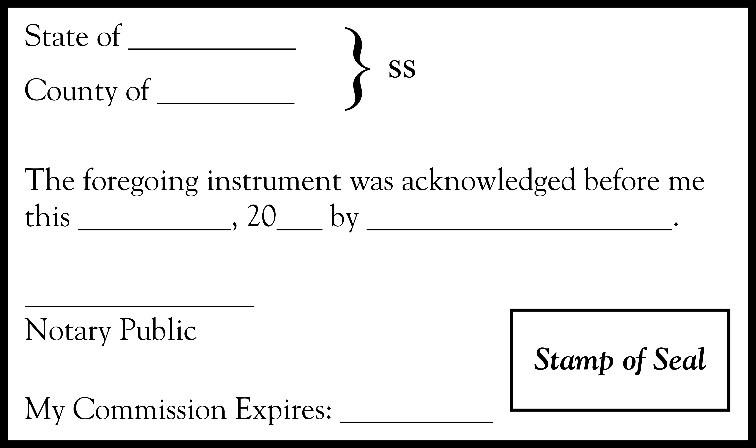Latin Abbreviations Printed on Notarial Certificates
Occasionally, notaries may find the letters "S.S." or "L.S." preprinted on a notarial certificate. Some notaries may be confused by this, and we have even seen notaries write the signer's Social Security Number after the letters "S.S." These letters are abbreviations for Latin phrases.
The letters "S.S." mean "scilicet," a Latin word that means "to wit" or "in particular." You may see this abbreviation near the blanks related to the location of the notarization, such as "State of ___, S.S. County of ____." This literally means, for example, “State of California, in particular, the County of Los Angeles."
Example of a notarial certificate that includes the “S.S.” abbreviation:

The letters “L.S.” stand for the Latin phrase “locus sigilli," which literally means "the location of the seal." This is meant to identify where the notary's seal should be affixed. If your state requires a rubber stamp seal, you should not affix the notary seal over these letters, as this would obscure the text of the seal.
These letters may also appear at the end of a signature line for the signer. This is a carry-over from a time when individuals had personal seals to authenticate their signatures. However, in modern times, a signer's signature is his or her seal, and nothing special needs to be done.
Occasionally, an individual signing a document on behalf of a corporation may affix the corporate seal over the words "L.S." at the end of the signature line.
In general, these abbreviations are decorative only and can be ignored. Of course, always be sure to consult your own state's laws.
Legal Disclaimer: The American Association of Notaries is committed to providing accurate and up-to-date information. However, it is important to note that the information provided on this page is for general informational purposes only and should not be relied upon as legal advice. We do not claim to be attorneys and do not guarantee the accuracy, completeness, or reliability of the information provided. It is your responsibility to know the appropriate notary laws governing your state. You should always seek the advice of a licensed attorney for any legal matters. In no event shall the American Association of Notaries, its employees, or contractors be liable to you for any claims, penalties, losses, damages, or expenses, howsoever arising, including, and without limitation, direct or indirect loss, or consequential loss, out of or in connection with the use of the information contained on any of the American Association of Notaries website pages. Notaries are advised to seek the advice of their state’s notary authorities or attorneys if they have legal questions.
-
Advertisement [8]
-
Affidavits [2]
-
Apostille [2]
-
Conflict of Interest [6]
-
Copy Certification [4]
-
Duties of a Notary [13]
-
Find a Notary - Notary Locator [1]
-
Foreign Language Documents [4]
-
Handling Difficult Notarization [10]
-
How to Become a Notary [19]
-
I-9 Forms [2]
-
Identifications [4]
-
Loan Signing Agent [5]
-
Maintaining Your Notary Commission [13]
-
Marketing [17]
-
Membership to Notary Association [3]
-
Mobile Notary [5]
-
Notarial Certificates [12]
-
Notary & Employer [6]
-
Notary Best Practices [82]
-
Notary Bonds [3]
-
Notary Commission [5]
-
Notary Courses - Online Course [1]
-
Notary Errors and Omissions Insurance [2]
-
Notary Fees [5]
-
Notary Fraud & Malpractice [3]
-
Notary Journals [13]
-
Notary Law Updates [22]
-
Notary News [3]
-
Notary Stamp and Supplies [40]
-
Practicing Law Without a License [14]
-
Privacy & Security [7]
-
Remote Online Notarization - (RONS) [4]
-
Steps to a Proper Notarization [82]
-
Taxes [4]
-
Website [2]
-
What Does a Notary Do? [22]
-
Wills [2]
- Read more
Notary bonds and errors and omissions insurance policies provided by this insurance agency, American Association of Notaries, Inc., are underwritten by Western Surety Company, Universal Surety of America, or Surety Bonding Company of America, which are subsidiaries of CNA Surety.